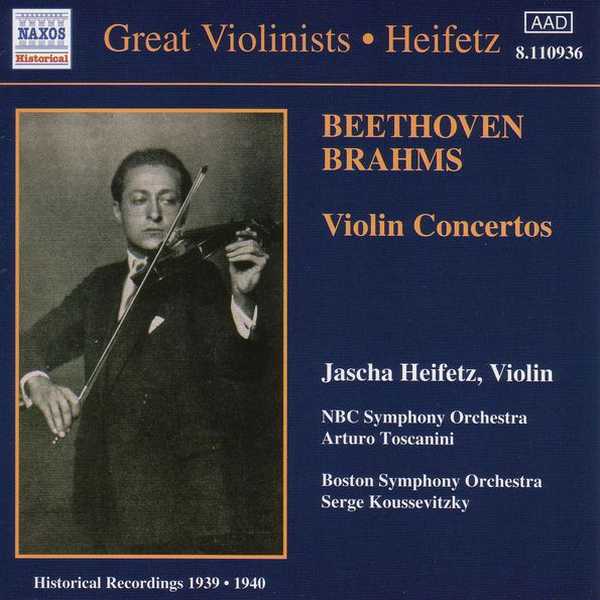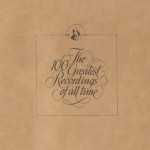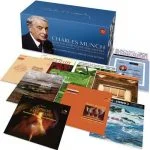
Composer: Ludwig van Beethoven, Johannes Brahms
Performer: Jascha Heifetz
Orchestra: NBC Symphony Orchestra, Boston Symphony Orchestra
Conductor: Arturo Toscanini, Serge Koussevitzky
Format: FLAC (tracks)
Label: Naxos
Catalogue: 8110936
Release: 2000
Size: 269 MB
Recovery: +3%
Scan: yes
Beethoven: Violin Concerto in D major, Op. 61
01. I. Allegro non troppo (cadenza: Auer-Heifetz)
02. II. Larghetto (cadenza: Joachim-Heifetz)
03. III. Rondo: Allegro (cadenza: Joachim-Auer-Heifetz)
Brahms: Violin Concerto in D major, Op. 77
04. I. Allegro ma non troppo (cadenza: Auer-Heifetz)
05. II. Adagio
06. III. Allegro giocoso, ma non troppo vivace
‘An old diamond in the rough’ is how Robert C Marsh (Toscanini and the Artof Orchestra Performance; London: 1956) recalled the original Victor 78s of this 1940 Heifetz Studio 8-H recording of the Beethoven.
Of the LP reissue he wrote: ‘On the whole, the recording is so dead and artificial that at times the thin line of violin sound reminds one of something from the golden age of Thomas Edison’s tinfoil cylinder rather than 1940.’ Early CD transfers suggested that all wasn’t lost but even they barely anticipated the extraordinary fineness of the sound we now have on this transfer by archivist and restorer Mark Obert- Thorn.
The performance itself is one of the most remarkable the gramophone has ever given us.
The visionary, high tessitura violin writing is realised by Heifetz with a technical surety which is indistinguishable, in the final analysis, from his sense of the work as one of Beethoven’s most sublime explorations of that world (in Schiller’s phrase) ‘above the stars where He must dwell’.
Those who would query the ‘depth’ of Heifetz’s reading miss this point entirely. To adapt Oscar Wilde, it is they who are in the gutter, Heifetz who is looking at the stars.
As for Toscanini’s contribution, it, too, is masterly.Now that we can actually hear the performance, the orchestral tuttis seem beautifully balanced both within themselves and vis-à-vis the soloist. As for the actual accompaniment, it’s discreet and self-effacing, fiery yet refined, and always wondrously subtle.
In the case of the Brahms, it’s more reasonable to argue that there are other ways of playing the concerto. Heifetz’s isn’t a Romantic reading. It’s lean, athletic, classical, aristocratic, finely drawn, an approach which wears exceptionally well on record. The Brahms enjoys another impeccable transfer. Musically and technically, this is a real thoroughbred of a release, unignorable at any price.



